Download
Roundup - September 2011/2
Brian Wilson
The September 2011/1 Roundup is here
and earlier editions can be found here.
The problems with passionato.com which I reported in the previous
Roundup seem to be deepening: my two most recent attempts to
download have ended in failure, so I must advise caution for
the moment. I’m assured, however, that they will be up and running
normally again in the near future and they have promised to
sort out any failed downloads.
I owe an apology for assuming last month that the new arkivmusic.eu
site was offering downloads, as its parent arkivmusic.com does
(in the USA only). It’s an online site only in that it sells
CDs and DVDs, so the prices which I mentioned as uncompetitive
for downloads are actually much more attractive than I thought.
Just to show how different responses to performances can be,
I note that the Pletnev Tchaikovsky Fifth Symphony which received
fairly short shrift from me in June 2011/2 has just received
a five-star review and been named Recording of the Month in
the BBC Music Magazine. (Pentatone PTC5186 385). De gustibus
non est disputandum.
Recording
of the Month
That’s Entertainment: A Celebration of the MGM Film Musical
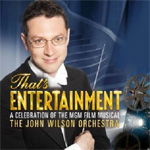 MGM
Jubilee Overture [7:46]
MGM
Jubilee Overture [7:46]
The Trolley Song (from Meet me in St Louis) [3:52]
Steppin’ Out With My Baby (from Easter Parade) [6:22]
The Heather on the Hill (from Brigadoon) [7:02]
Barn Dance (from Seven Brides for Seven Brothers) [5:45]
You’re Sensational (from High Society) [3:07]
I Got Rhythm (from An American in Paris) [5:35]
Singin’ in the Rain (from Singin’ in the Rain) [3:58]
An American in Paris - Main Title [2:56]
Love is Here to Stay (from An American in Paris) [4:03]
Well, did you evah? (from High Society) [3:36]
The New Moon - Sequence: One Kiss/Lover Come Back To Me (from
The New Moon) [6:43]
That’s Entertainment (from That’s Entertainment )[3:45]
Broadway Melody Ballet (from Singin’ in the Rain) [13:18]
Matthew Ford; Kim Criswell; Sarah Fox; Curtis Stigers; Seth
MacFarlane; Maida Vale Singers;
The John Wilson Orchestra/John Wilson
EMI CLASSICS 0288452 [77:47] - from amazon.co.uk
(mp3)
If, like me, you were carried away by John Wilson and his team
at this year’s Proms, broadcast on Radio 3 and BBC2, you need
have no hesitation in downloading this release, timed to coincide
with the Prom performance. It’s a shorter programme and you
miss the visual entertainment of the singers coming on singly
or in pairs, but otherwise this captures all the enjoyment.
The mp3 sound is very good, considering that most of the tracks
fall below amazon.co.uk’s usual 256kb/s standard.
Bargains
of the Month
Pyotr Ilyich TCHAIKOVSKY (1840-1893)
The Sleeping Beauty
Minneapolis Symphony Orchestra/Antal Doráti - rec.1955.
ADD
NAXOS CLASSICAL ARCHIVE 9.80591-3 [3 CDs: 2:30:13] -
from classicsonline.com
or emusic.com
(both mp3)
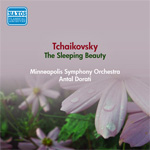 The
sound is over-bright and rather thin - much more so than the
Ansermet Ravel (below) which was recorded the previous year
- and emusic.com reduce the bit-rate to a measly 155kb/s but
the ear adjusts and this is well worth having as a reminder
of Doráti’s idiomatic way with Tchaikovsky, especially
in this earlier Minneapolis version, a great favourite of mine
in its earlier incarnation on the budget Fontana LP label. It
comes on five tracks for just £2.10 or less to add to
its attractions. From classicsonline.com, in better 320kb/s
sound, it’s still a good bargain for £5.97. Better still
is the Past Classics transfer of Doráti’s 1957 Minneapolis
Swan Lake (see the review of the CfP/Previn recording
below).
The
sound is over-bright and rather thin - much more so than the
Ansermet Ravel (below) which was recorded the previous year
- and emusic.com reduce the bit-rate to a measly 155kb/s but
the ear adjusts and this is well worth having as a reminder
of Doráti’s idiomatic way with Tchaikovsky, especially
in this earlier Minneapolis version, a great favourite of mine
in its earlier incarnation on the budget Fontana LP label. It
comes on five tracks for just £2.10 or less to add to
its attractions. From classicsonline.com, in better 320kb/s
sound, it’s still a good bargain for £5.97. Better still
is the Past Classics transfer of Doráti’s 1957 Minneapolis
Swan Lake (see the review of the CfP/Previn recording
below).
Passionato.com have the 1995 Doráti recording with the
Concertgebouw (Philips Duo 446
1662, mp3, £12.99) but that can be obtained on
CD for around £9 - and bear in mind what I have said above
about the problems with Passionato. Classicsonline.com also
offer the slightly abridged Weldon recording on EMI Classics
for Pleasure, two CDs for just £3.99 - see below.
Maurice RAVEL (1875-1937)
L’Enfant et les Sortilèges
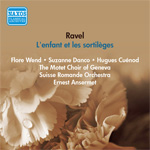 Suzanne
Danco, (soprano); Flore Wend (contralto); Hugues Cuénod
(tenor); Motet Choir of Geneva; L’Orchestre de la Suisse
Romande/Ernest Ansermet - rec.1954. ADD
Suzanne
Danco, (soprano); Flore Wend (contralto); Hugues Cuénod
(tenor); Motet Choir of Geneva; L’Orchestre de la Suisse
Romande/Ernest Ansermet - rec.1954. ADD
NAXOS CLASSICAL ARCHIVE 9.80161 [41:53] - from classicsonline.com
or emusic.com
(both mp3)
This classic recording has come up as fresh as paint in the
Naxos Archive transfer, even in the version from emusic.com,
at a miserly 155-160kb/s. At £0.84 or less, that’s
a better bargain than the classicsonline.com price of £1.99,
but the latter comes at 320kb/s and will hardly break the bank.
At these prices the short playing time hardly matters. If anything,
the performance is fresher than the Maazel recording on DG which
I recommended in the May
2009 Roundup or the more recent Rattle recording - see review
by Dominy Clements.
Manuel de FALLA (1876-1946)
El Amor brujo (Love the magician): Suite* [16:06]
El Sombrero de tres picos (The three-cornered hat) [35:45]
London Philharmonic Orchestra/Anthony Collins*; Suzanne Danco
(soprano); Suisse Romande Orchestra/Ernest Ansermet - rec.1950*,
1955. ADD.
NAXOS CLASSICAL ARCHIVE 9.80466 [51:55] - from classicsonline.com
or emusic.com
(both mp3)
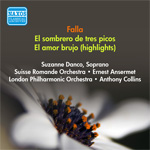 I
associate Anthony Collins and his Decca recordings with Sibelius
and Delius, so I at first assumed that all the items here had
been conducted by Ansermet, whom I do associate with Falla.
That’s a roundabout way of saying that I thought the Amor
brujo here thoroughly idiomatic and well recorded for its
date, if a trifle shrill. I haven’t heard the Eloquence
reissue of this version of El Sombrero with the complete
Amor brujo (480 0077 - see review
by Göran Forsling) but this Naxos Classical Archive sounds
acceptable, even at emusic.com’s low bit-rate. (The classicsonline.com
version comes at a better bit-rate and actually costs a few
pence less at £1.99.) Ansermet remade El Sombrero
in stereo in a recording with Teresa Berganza which is still
available on Decca Legends 466 9912, available for download
from passionato.com - here.
(See 3-star review by Rob Barnett). They also have the Double
Decca recording of Ansermet’s Amor and Sombrero,
coupled with Nights in the Gardens of Spain (Larrocha and Burgos),
etc. (433 9082 - mp3 for £7.99, lossless for £9.99).
As this appears to be deleted on CD in the UK, the lossless
download seems particularly appealing.
I
associate Anthony Collins and his Decca recordings with Sibelius
and Delius, so I at first assumed that all the items here had
been conducted by Ansermet, whom I do associate with Falla.
That’s a roundabout way of saying that I thought the Amor
brujo here thoroughly idiomatic and well recorded for its
date, if a trifle shrill. I haven’t heard the Eloquence
reissue of this version of El Sombrero with the complete
Amor brujo (480 0077 - see review
by Göran Forsling) but this Naxos Classical Archive sounds
acceptable, even at emusic.com’s low bit-rate. (The classicsonline.com
version comes at a better bit-rate and actually costs a few
pence less at £1.99.) Ansermet remade El Sombrero
in stereo in a recording with Teresa Berganza which is still
available on Decca Legends 466 9912, available for download
from passionato.com - here.
(See 3-star review by Rob Barnett). They also have the Double
Decca recording of Ansermet’s Amor and Sombrero,
coupled with Nights in the Gardens of Spain (Larrocha and Burgos),
etc. (433 9082 - mp3 for £7.99, lossless for £9.99).
As this appears to be deleted on CD in the UK, the lossless
download seems particularly appealing.
Ross EDWARDS (b.1943) Star Chant
Symphony No.1, Da pacem Domine (1991) [27:25]
Symphony No.4, ‘Star Chant’ (2001) [32:37]
Adelaide Philharmonia Chorus; Adelaide Chorus; Adelaide Symphony
Orchestra/Richard Mills - rec.2002. DDD
No booklet but this is available online, with texts, from Buywell
(see below)
ABC CLASSICS 476 6161 [60:02] - from emusic.com
(mp3)
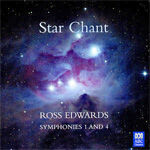 This
could easily have gone into the Discovery of the Month category
- I’ve never knowingly heard anything by Australian composer
Ross Edwards before: I should have read Tim Perry’s Recording
of the Month review,
which I didn’t discover till I’d heard the music.
Lovers of the likes of Arvo Pärt or Einojuhani Rautavaara
should like what they hear on this recording. Complete on just
three tracks for £1.26 or less, it’s enough of a
bargain for you to try it out. Those who don’t subscribe
to emusic.com will find it for £7.49 from amazon.co.uk.
This
could easily have gone into the Discovery of the Month category
- I’ve never knowingly heard anything by Australian composer
Ross Edwards before: I should have read Tim Perry’s Recording
of the Month review,
which I didn’t discover till I’d heard the music.
Lovers of the likes of Arvo Pärt or Einojuhani Rautavaara
should like what they hear on this recording. Complete on just
three tracks for £1.26 or less, it’s enough of a
bargain for you to try it out. Those who don’t subscribe
to emusic.com will find it for £7.49 from amazon.co.uk.
The bit-rates, ranging from 221 to 227kb/s are well short of
the maximum 320kb/s but the recording sounds more than acceptable
in this form. There are no notes, but Buywell generously offer
a pdf booklet free - here.
It includes the names of the constellations in various languages,
including Australian aborigine, which are chanted in the Fourth
Symphony, divided across the two movements - The Northern Sky
and The Southern Sky:
Alioth, Mizar, Alkaid, Alcor.
Capella: Purra. Deneb: Woorbrady.
Lyra: Neilloan; Vega: Boi-Boi.
Aquila: Totyarguil; Altair: Ku-ur-rook.
Arcturus: Marpeankurrk. Delphinus: Otchocut.
Pleiades: Meamei; Aldebaran: Karambal.
Aldebaran: Gellarec. Procyon: Beegerer.
Pleiades, Hyades, Orion: Tjilpuna.
Orion: Njiru; Pleiades: Kungkarungkara.
Hydra: Unwala. Spica: Gurie.
Sirius: Warepil. Fomalhaut: Gani.
Antares: Djuit; Scorpius: Ingalpir.
Antares: Alkarinja. Archernar: Agnura.
Proxima Centauri, Proxima Centauri.
Canopus: Wahn. Crux Australis: Waluwara;
Crux Australis: Yaraan-do; Crux Australis: Wanamoumitja.
Crux, Centaurus: Iritjinga; Crux, Centaurus: Mirrabooka.
Sigma Octantis, Sigma Octantis.
Discovery
of the Month
Robert SCHUMANN (1810-1856) Complete
Works for Violin and Orchestra
Concerto in a minor for violin and orchestra, after the Concerto
in a minor for cello and orchestra, Op.129 (1850: Violin version
by the composer) [22:31]
Fantasy in C for violin and orchestra, Op. 131 (1853) [16:20]
Concerto in d minor for violin and orchestra (1853) [32:22]
Ulf Wallin (violin); Robert-Schumann-Philharmonie/Frank Beermann
- rec.2009. DDD/DSD
Pdf booklet of notes included
BIS BIS-SACD-1775 [72:30] - from eclassical.com
(mp3 and 16- and 24-bit lossless)
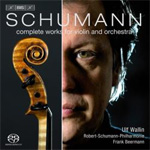 It’s
not my discovery this month but a recording which I imagine
will be an eye-opener for many readers who have been told that
Schumann’s Violin Concerto is a flop. I already knew otherwise,
despite the apparent opinions of Clara Schumann and Joachim,
the violinist for whom the work had been intended, but this
recording definitively proves it. What did come as a pleasant
surprise to me was how well Schumann’s own transcription of
the Cello Concerto sounds. The Fantasy, too, is a welcome addition.
It’s
not my discovery this month but a recording which I imagine
will be an eye-opener for many readers who have been told that
Schumann’s Violin Concerto is a flop. I already knew otherwise,
despite the apparent opinions of Clara Schumann and Joachim,
the violinist for whom the work had been intended, but this
recording definitively proves it. What did come as a pleasant
surprise to me was how well Schumann’s own transcription of
the Cello Concerto sounds. The Fantasy, too, is a welcome addition.
With most persuasive performances and informative documentation,
this has to receive a strong recommendation. The recording is
excellent, especially in 24-bit format, where nothing is missing
except the surround channels of the SACD. The price is very
attractive, too: $8.54 for mp3 or 16-bit flac, $12.81 for 24-bit.
[In the process of coverting this Roundup as a webpage, I’m
please to see that Gavin Dixon hasenjoyed this recording as
much as I have:
The time has certainly come to reassess these fine works after
a century and a half of wholly undeserved neglect. Perhaps the
challenges they pose are not the sort of challenges that 19th
century virtuosi relished. ... Ulf Wallin is a soloist who clearly
relished these kinds of challenges.
See his full review here.]
EMI Classics
on classicsonline.com and Naxos Music Library
Classicsonline.com are currently adding the EMI Classics and
Virgin Classics catalogues to their download labels, with availability
for streaming from the Naxos Music Library - a particularly
valuable facility, since passionato.com have recently dropped
these labels. The classicsonline.com acquisition doesn’t entirely
compensate, since passionato.com used also to offer lossless
flac for many of these recordings. I’m concentrating this time
on good performances which offer especially good value - I’ve
appended UK prices - because there are some pricing anomalies
at present. Please note that catalogue numbers differ from the
corresponding UK CD numbers. My grumble about oddities of price
in my last Roundup appeared at one stage to have been addressed
until some uncompetitive prices for most of the budget-price
2-CD sets were restored.
[NB: on the very cusp of converting
this Roundup to html, I note that Gemini 2-CD sets have reverted
to a reasonable £6.99. please ignore anything that I’ve
said below to the contrary]
Joseph HAYDN (1732-1809) London
Symphonies Vol.1 (1791/2)
CD1
Symphony No.93 in D [23:09]
Symphony No.94 in G (Surprise) [22:36]
Symphony No.95 in c minor [19:34]
CD2
Symphony No.96 in D [21:38]
Symphony No.97 in C [23:43]
Symphony No.98 in B-flat [25:16]
Royal Philharmonic Orchestra/Sir Thomas Beecham - rec.1957/8.
Mono/ADD.
EMI CLASSICS GEMINI 0724358577051 [2CDs: 2:15:54] - from
classicsonline.com
(mp3, £6.99)
[Bargain of the Month - see review
by Terry Barfoot]
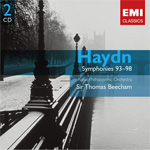 I
cut my Haydn symphonic teeth on Beecham’s earlier accounts
of Nos. 93 and 94, once available on Philips Classical Favourites.
For all that I’ve heard and greatly enjoyed other versions
across the years, notably Colin Davis, now on a pair of inexpensive
Philips Duo CDs, and Karl Böhm, whose complete London Symphonies
I recommended in July
2011/2, it’s been a delight to return to Beecham, inauthentic
editions and decently refurbished mono sound notwithstanding.
In fact, I never deserted Sir Thomas’s Haydn: the reissue
of two of the later London Symphonies, formerly on Classics
for Pleasure, is still part of my regular listening. I’m
surprised, however, that though Beecham plays the surprise in
No.94 to the full, he misses Haydn’s little joke with the
harpsichord at the end of No.98, which Böhm plays up, especially
in the bonus 1960s recording included with his set.
I
cut my Haydn symphonic teeth on Beecham’s earlier accounts
of Nos. 93 and 94, once available on Philips Classical Favourites.
For all that I’ve heard and greatly enjoyed other versions
across the years, notably Colin Davis, now on a pair of inexpensive
Philips Duo CDs, and Karl Böhm, whose complete London Symphonies
I recommended in July
2011/2, it’s been a delight to return to Beecham, inauthentic
editions and decently refurbished mono sound notwithstanding.
In fact, I never deserted Sir Thomas’s Haydn: the reissue
of two of the later London Symphonies, formerly on Classics
for Pleasure, is still part of my regular listening. I’m
surprised, however, that though Beecham plays the surprise in
No.94 to the full, he misses Haydn’s little joke with the
harpsichord at the end of No.98, which Böhm plays up, especially
in the bonus 1960s recording included with his set.
TB’s well-deserved accolade actually cover the two volumes
which were released simultaneously on Gemini, but whereas the
first (above) costs a very reasonable £6.99, Volume 2
began at an uncompetitive £13.98, was briefly reduced
to £6.99 like volume 1, but then appears to have gone
up in price again. [Now back to £6.99 as I convert this
Roundup to html.] All four CDs, together with Beecham’s
Seasons and his Mozart also come on a 10-CD set for around
£23 (9099462 - see review).
Ludwig van BEETHOVEN (1770-1827)
Piano Sonata No. 8 in c minor, Op. 13, Pathétique
(1799) [21:51]
Piano Sonata No. 17 in d minor, Op. 31/2 (1802) [25:48]
Piano Sonata No. 23 in f minor, Op. 57, Appassionata
(1805) [24:54]
Ingrid Fliter (piano) - rec. 2010. DDD
EMI CLASSICS 5099909457355 [72:58] - from classicsonline.com
(mp3, £7.99)
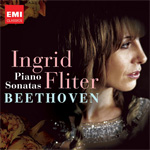 [Bargain
of the Month - see review
by William Hedley]
[Bargain
of the Month - see review
by William Hedley]
There have been some highly recommendable Beethoven piano sonata
recordings in recent month, but this from Ingrid Fliter, part
of which is included on the EMI sampler which I recommended
as Freebie of the Month in August 2011/1, is one of the very
best. Try the extract on that sampler - which is now no longer
free but costs £7.99 - and you’ll want the whole programme.
The recording does justice to these excellent performances and
the download price of £7.99 shaves over a pound off the
price of the CD.
Hector BERLIOZ (1803-1869)
Symphonie Fantastique, H48, Op.14 [56:01]; Le Carnaval
Romain, Op.9 [9:14]
Anima Eterna Brugge/Jos van Immerseel
ZIG-ZAG TERRITOIRES ZZT100101 [65:15] - from classicsonline.com
(mp3)
Symphonie Fantastique [52:34]; Overture Le Corsaire
[7:58]; Les Troyens: Royal Hunt and Storm and Trojan
March [14:35]
Orchestre National de RTF; Royal Philharmonic Orchestra/Sir
Thomas Beecham - rec. Salle Wagram, Paris, 1957, Abbey Road
Studio, London, 1958/9. ADD.
EMI MASTERS 5099991870957 [74:53] - from classicsonline.com
(mp3, £5.99) or stream from Naxos Music Library
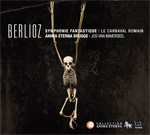 I
reviewed both of these recordings in May
2010, together with a third recording by Charles Dutoit
(DG Concerts 475 8204), giving links to emusic.com and passionato.com
respectively. You’ll find a better quality download of
the Immerseel at classicsonline.com, though at £7.99 it’s
a little more expensive than from emusic.com, and the passionato.com
link for the Beecham no longer works. In any case, the new re-reissue
on EMI Masters offers better value than the earlier GROC version.
I
reviewed both of these recordings in May
2010, together with a third recording by Charles Dutoit
(DG Concerts 475 8204), giving links to emusic.com and passionato.com
respectively. You’ll find a better quality download of
the Immerseel at classicsonline.com, though at £7.99 it’s
a little more expensive than from emusic.com, and the passionato.com
link for the Beecham no longer works. In any case, the new re-reissue
on EMI Masters offers better value than the earlier GROC version.
For convenience, I’ll repeat what I wrote then:
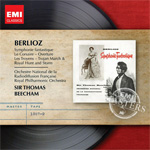 There’s
something old here [and] something new … [both] are excellent
in their different ways. The Beecham recording has been
a classic almost since it was first released; though it was
challenged early in its life by rival versions from Klemperer
(no longer available) and Davis (till recently available on
Eloquence), it survived unscathed and became a genuine Great
Recording of the Century. Generously coupled and re-mastered,
it remains one of the few versions of this symphony which retain
my attention all the way through, when other versions leave
me slightly off message in one movement or another. The recording
could not be mistaken for modern DDD - it sounds just a little
coarse in places - but it is very good for its age.
There’s
something old here [and] something new … [both] are excellent
in their different ways. The Beecham recording has been
a classic almost since it was first released; though it was
challenged early in its life by rival versions from Klemperer
(no longer available) and Davis (till recently available on
Eloquence), it survived unscathed and became a genuine Great
Recording of the Century. Generously coupled and re-mastered,
it remains one of the few versions of this symphony which retain
my attention all the way through, when other versions leave
me slightly off message in one movement or another. The recording
could not be mistaken for modern DDD - it sounds just a little
coarse in places - but it is very good for its age.
Van Immerseel’s new account also retains my attention
all through. The employment of period instruments is scrupulous
but never done for its own sake; only the substitution of two
period pianos for the bells in the finale struck the wrong note
to my ears - and Immerseel claims Berlioz’s own sanction for
their employment. The sound is lean and mean - quite the opposite
of Beecham, who, even if he had known Berlioz’s preference for
the kind of drum sticks employed by Immerseel, wouldn’t have
given a hoot. Yet the two conductors somehow arrive at the same
place by different routes.
Felix MENDELSSOHN (1809-1847)
A Midsummer Night’s Dream - overture and complete incidental
music
Lillian Watson (soprano); Delia Wallis (mezzo-soprano); Finchley
Children’s Music Group; London Symphony Orchestra/André
Previn
EMI CLASSICS ENCORE 0724357498159 [57:21] - from classicsonline.com
(mp3, £4.99)
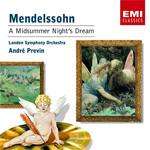 This
is a thorough delight. Reviewing the Eloquence reissue of Midsummer
Night’s Dream and die erste Walpurgisnacht (Ashkenazy
and Dohnányi, 480 1279 - see review),
which I thought well worth having for the latter, I recommended
two EMI recordings of the Dream, Andrew Litton on Classics
for Pleasure (no longer available) and this André Previn
version. That Eloquence reissue is excellent value, with 33
minutes of Walpurgisnacht added to the Dream,
but Previn includes more of the Dream music, especially
the vocal items, and, though 57 minutes is short, the quality
of the performance and the attractive price more than compensate
- but be aware that classicsonline.com are also offering the
older version of this recording at an uncompetitive £7.99:
be sure to choose the Encore version. The recording and mp3
transfer are very good.
This
is a thorough delight. Reviewing the Eloquence reissue of Midsummer
Night’s Dream and die erste Walpurgisnacht (Ashkenazy
and Dohnányi, 480 1279 - see review),
which I thought well worth having for the latter, I recommended
two EMI recordings of the Dream, Andrew Litton on Classics
for Pleasure (no longer available) and this André Previn
version. That Eloquence reissue is excellent value, with 33
minutes of Walpurgisnacht added to the Dream,
but Previn includes more of the Dream music, especially
the vocal items, and, though 57 minutes is short, the quality
of the performance and the attractive price more than compensate
- but be aware that classicsonline.com are also offering the
older version of this recording at an uncompetitive £7.99:
be sure to choose the Encore version. The recording and mp3
transfer are very good.
Giuseppe VERDI (1813-1901) Falstaff
Tito Gobbi - bass-baritone (Falstaff)
Luigi Alva - tenor (Fenton)
Rolando Panerai - baritone (Ford)
Tomaso Spataro - tenor (Dr Caius)
Renato Ercolani - tenor (Bardolfo)
Nicola Zaccaria - bass (Pistola)
Elizabeth Schwarzkopf - soprano (Alice Ford)
Anna Moffo - soprano (Nannetta)
Nan Merriman - mezzo soprano (Meg Page)
Fedora Barbieri - contralto (Mistress Quickly)
Phiharmonia Orchestra & Chorus/Herbert von Karajan - rec.1956.
DDD.
EMI CLASSICS HOME OF OPERA 5099994819953 [2 CDs: 119:42]
- from classicsonline.com
(mp3, £8.99)
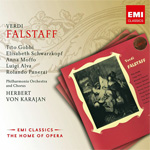 Christopher
Fifield described this in its earlier reissue on the EMI Great
Recordings label as 'truly one of the Great Recordings of the
Century’ - see review.
It had strong rivals then and more have appeared since on CD
and DVD, but this is still the version for most opera buffs.
Cast, direction and orchestral support are ideal and the recording
still sounds very well.
Christopher
Fifield described this in its earlier reissue on the EMI Great
Recordings label as 'truly one of the Great Recordings of the
Century’ - see review.
It had strong rivals then and more have appeared since on CD
and DVD, but this is still the version for most opera buffs.
Cast, direction and orchestral support are ideal and the recording
still sounds very well.
Two earlier versions are still available and classicsonline.com
has the earlier EMI Historical release for £1 less - £7.99
- here.
Avoid the Great Recordings version at £14.99. There’s
no libretto or translation with any download - it’s a shame
that the bonus third CD with the latest release was not included
- but these are easily available online. Squeezebox had some
problems with some of the tracks - of its own making, I think,
perhaps because of the large amount of textual information -
so it’s probably better to burn to CDR, where it sounds
fine.
Colin Davis’s rival version on LSO Live is also available
from classicsonline.com - here
- but it’s not competitively priced at £15.98: the
2-CD set (as opposed to the more expensive SACDs) can be bought
for around £9.50. Emusic.com have the Toscanini version
from Past Classics for £2.52 or less - here
- and the Karajan - here
- for the same price but Past Classics transfers are unlikely
to sound as well as EMI’s own.
Pyotr Ilyich TCHAIKOVSKY (1840-1893)
The Nutcracker, Op.71 (complete) [86:12]
Romeo and Juliet Overture [20:40]
Marche Slave [9:41]
1812 Overture [16:31]
Sergei PROKOFIEV (1891-1953)
Cinderella, Op.87 (highlights) [15:42]
London Symphony Orchestra/André Previn - rec.1972. ADD
EMI CLASSICS FOR PLEASURE 0094639323357 [2CDs: 72:00
+ 76:48] - from classicsonline.com
(mp3, £6.99)
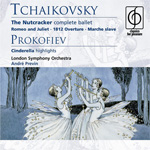 The
well-filled CfP version is good value at £6.99, but beware
- classicsonline.com also have the more recent 2-CD set of Nutcracker
with Løvenskiold’s La Sylphide, as reviewed
by Dan Morgan here:
it’s now offered at a very uncompetitive price of £15.98,
around twice the UK price of the parent CD set. [Now reduced
to a more feasible £7.99 as I go to press, but I imagine
that most will prefer the CfP coupling anyway.]
The
well-filled CfP version is good value at £6.99, but beware
- classicsonline.com also have the more recent 2-CD set of Nutcracker
with Løvenskiold’s La Sylphide, as reviewed
by Dan Morgan here:
it’s now offered at a very uncompetitive price of £15.98,
around twice the UK price of the parent CD set. [Now reduced
to a more feasible £7.99 as I go to press, but I imagine
that most will prefer the CfP coupling anyway.]
Whichever coupling you choose, Previn’s Nutcracker
is one of the best performances of all time and it still sounds
well in a good mp3 transfer - when classicsonline.com says 320kb/s,
that’s what you invariably get in my experience. Only Ansermet’s
Nutcracker, now on Eloquence 480 0557, has such classic
status - my version on the former Decca Weekend label comes
out every Christmas - but the Previn, even in mp3 form, sounds
fuller than the Ansermet, which, with recent increases in the
price of Eloquence CDs in the UK, is no longer such a super-bargain
at around £12.
The remaining Tchaikovsky items are good, but not as special
as Nutcracker. The highlights from Cinderella come from
the recommendable complete set on two EMI CDs, available from
classicsonline.com here
with the Classical Symphony or in its latest reissue here
with excerpts from Raymonda, but at prices twice as much as
those of the equivalent CD sets in the UK. [NB: now reduced
to £6.99 and £7.99 respectively.]
Pyotr Ilyich TCHAIKOVSKY The
Sleeping Beauty (slightly abridged)
Philharmonia Orchestra/George Weldon - rec. c.1958. ADD.
EMI CLASSICS FOR PLEASURE 0094639323852 [2CDs: 2:02:37]
- from classicsonline.com
(mp3, £3.99)
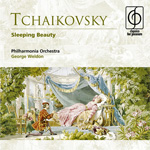 This
recording sounds better than the Doráti (above): very
acceptable though hardly new-minted. The slightly-abridged performance
is good, though I note that it has divided reviewers - it’s
not quite as sparkling as the Doráti, so it’s swings
and roundabouts in terms of completeness, performance and recording.
This
recording sounds better than the Doráti (above): very
acceptable though hardly new-minted. The slightly-abridged performance
is good, though I note that it has divided reviewers - it’s
not quite as sparkling as the Doráti, so it’s swings
and roundabouts in terms of completeness, performance and recording.
In terms of price, both Doráti and Weldon offer excellent
value, with classicsonline.com asking a very reasonable £3.99
for the two CDs. Emusic.com have the Weldon recording for £1.68
or less in a Past Classics transfer - here
- usually transfers from this source are acceptable, but I haven’t
heard this one, so caveat emptor; I can’t vouch
for it.
Pyotr Ilyich TCHAIKOVSKY
Swan Lake Op.20 (1877) [155:38]
Ida Haendel (violin), Douglas Cummings (violoncello)
London Symphony Orchestra/André Previn - rec.1976. ADD.
CLASSICS FOR PLEASURE 0094639324354 [77:52 + 77:46] -
from classicsonline.com
(mp3, £5.99)
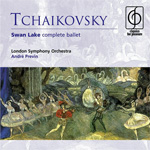 Christopher
Howell was not entirely sold on Previn’s way with this
ballet; though he thought it a ‘safe’ recommendation,
he preferred a CD of extracts from Fistoulari’s stereo
(Phase 4) recording - see review.
My own response is more positive and more in line with general
critical opinion. I may prefer some aspects of the earlier (mono)
Fistoulari and Doráti versions mentioned below, but Previn
is more complete than the former and better recorded than either
of those mono versions and the mp3 transfer is very good.
Christopher
Howell was not entirely sold on Previn’s way with this
ballet; though he thought it a ‘safe’ recommendation,
he preferred a CD of extracts from Fistoulari’s stereo
(Phase 4) recording - see review.
My own response is more positive and more in line with general
critical opinion. I may prefer some aspects of the earlier (mono)
Fistoulari and Doráti versions mentioned below, but Previn
is more complete than the former and better recorded than either
of those mono versions and the mp3 transfer is very good.
CH criticised the length of some of the tracks, but that’s a
positive virtue in a download, since it reduces the number of
joins, each potentially the cause of brief drop-outs. The asking
price of £5.99 is very reasonable but classicsonline.com
also offer the more recent reissue of this recording for a very
much less reasonable £17.98 - the CDs cost around £7.50
in the UK. This is the sort of pricing anomaly that I’ve drawn
to the attention of classicsonline.com’s parent company Naxos
in the hope that it can be sorted.
If you’re looking for an inexpensive and idiomatic alternative,
Naxos Historical Archives have Anatole Fistoulari’s
1952 recording with the LSO of the almost complete score - roughly
two thirds - on 9.80724/5. Download from classicsonline.com
- here
- for £3.98. (Not available in the USA). It’s mono
only, but surprisingly good for its age - better than the Doráti
Sleeping Beauty (above) and better than I remember it
sounding on Ace of Clubs LPs; I enjoyed rehearing it - and you
may prefer it to the Phase 4 sound of his remake.
The incomplete Fistoulari version was challenged in 1957 by
Antal Doráti’s recording with the Minneapolis
Symphony Orchestra of a more complete version of the score for
Mercury. That’s available for a very inexpensive £1.68
in a Past Classics release from emusic.com - here.
I’ve known this version through several LP incarnations,
on the Philips GL label and Fontana and I’m pleased to
hear it again. Though a bit-rate as low as 158kb/s leaves a
great deal to be desired, it sounds at least as well as when
I last heard it on LP, with a fuller-bodied sound than the Doráti
Sleeping Beauty (above). Both the Fistoulari and Doráti
come with each act complete on one track, which means that you
could burn either complete to a CDR in mp3 form without suffering
the mp3 hazard of drop-outs between tracks where the music is
continuous.
I could happily live with any of these three in preference to
yet another budget-price release: Wolfgang Sawallisch, formerly
on CfP and now on EMI Gemini. How gratifying it is to have such
choice. And I haven’t even mentioned the Gergiev
version. I recommended the passionato.com download of this not
very complete Swan Lake (475 7669) in June
2010; in view of the problems which passionato.com seem
to be experiencing, I’d better redirect you - amazon.co.uk
seem to have only the highlights from this set, actually better
value time-wise than the complete set; otherwise it has to be
iTunes for £12.99 - here.
Jean SIBELIUS (1865-1957)
Lemminkäinen Suite, Op.22 (Legends) [45:50] - Lemminkäinen
and the Maidens of the Island [16:12]; The Swan of Tuonela [9:03];
Lemminkäinen in Tuonela [14:22]; Lemminkäinen’s Return
[6:15]
Philadelphia Orchestra/Eugene Ormandy - rec.1978. ADD
Tapiola, Op.112 [14:53]
Helsinki Philharmonic Orchestra-Orchestra/Paavo Berglund - rec.1987.
DDD
EMI CLASSICS ENCORE 0094638867951 [60:45] - from classicsonline.com
(mp3, £5.99)
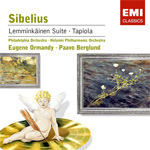 [‘The
main sell here is the Lemminkainen four tone poems but
this Tapiola is by no means negligible. Good to be reminded
in such a forceful way of the golden late afternoon of Ormandy
and the Philadelphia’s conjoined career. Outstanding Sibelius
and outstanding analogue technology.’ - see full review
by Rob Barnett.]
[‘The
main sell here is the Lemminkainen four tone poems but
this Tapiola is by no means negligible. Good to be reminded
in such a forceful way of the golden late afternoon of Ormandy
and the Philadelphia’s conjoined career. Outstanding Sibelius
and outstanding analogue technology.’ - see full review
by Rob Barnett.]
I enjoyed Petri Sakari’s account of the Lemminkäinen
and Karelia Suites (Naxos 8.554265, also available
from classicsonline.com - here
- for £4.99) in February
2009, but Ormandy’s version alternately knocks you
off your seat and enchants on an even higher level. With excellently
refurbished sound and a good mp3 transfer, the only thing left
to say is that £5.99 is pushing at the upper limit of
competiveness when Encore CDs can be purchased for around £5
in the UK and classicsonline.com charge a more reasonable £3.99
or £4.99 for other albums in this series. As it happens,
this particular album is deleted as a CD, so the download is
especially welcome, even at the price.
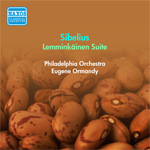 Classicsonline.com
also have Ormandy’s even more powerful 1951 mono version
of the Lemminkäinen Suite - a snip at £1.99,
though the sound is, of course, dated, but excellent for its
age (Naxos Classical Archives 9.80350 [44:26] - here).
Try it from the Naxos Music Library. (Not available to download
or stream in the USA). It has also been added very recently
to the Pristine Classics roster.
Classicsonline.com
also have Ormandy’s even more powerful 1951 mono version
of the Lemminkäinen Suite - a snip at £1.99,
though the sound is, of course, dated, but excellent for its
age (Naxos Classical Archives 9.80350 [44:26] - here).
Try it from the Naxos Music Library. (Not available to download
or stream in the USA). It has also been added very recently
to the Pristine Classics roster.
Osmo Vänskä and the Lahti SO offer the conventional
Op.22 Lemminkäinen Suite plus alternative versions
and alternative endings of some of the constituent parts on
BIS-CD-1015, available from eclassical.com - here
- in mp3 and lossless sound. (See Len Mullenger’s 5-star
review.)
If you want just Vänskä’s version of the usual
Suite from this set, without the extras, you’ll find it
on the super-bargain Sibelius bundle from amazon.co.uk which
Nick Barnard and I recommended in June
2011/2.
Jean SIBELIUS (1865-1957)
Symphony No. 7 in C, Op.105 [20:23]
Tapiola, Op.112 [17:47]
The Oceanides, Op.73 [10:20]
Pelleas and Melisande Suite, Op.46 [27:33]
Royal Philharmonic Orchestra/Sir Thomas Beecham - rec.1955.
ADD
EMI CLASSICS GREAT RECORDINGS OF THE CENTURY 5099950969258
[76:44] - from classicsonline.com
(mp3, £5.99)
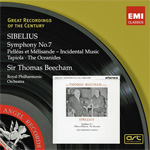 [Bargain
of the Month - see review
by Ewan McCormick: ‘Throughout this disc the performances
are of the very highest standard, with Beecham’s accustomed
sensitivity to phrasing and dynamics. Recordings have come up
newly minted in these transfers, sounding richer and more spacious
than ever. A Great Recording of the Century, beyond a doubt.’]
[Bargain
of the Month - see review
by Ewan McCormick: ‘Throughout this disc the performances
are of the very highest standard, with Beecham’s accustomed
sensitivity to phrasing and dynamics. Recordings have come up
newly minted in these transfers, sounding richer and more spacious
than ever. A Great Recording of the Century, beyond a doubt.’]
There’s very little that I need add to EM’s review, except to
say that a 7" EP of extracts from Beecham’s Pelleas
Suite which opens the programme so effectively was one of my
earliest Sibelius recordings and that it sounds much better
now than it did in that format. At £5.99 it’s competitive
with the CD, which typically sells for around £7. An essential
download; the only reason not to obtain it would be that it’s
likely to be transferred to the even less expensive EMI Masters
label shortly.
Arthur BLISS (1891-1975) Bliss
conducts Bliss
Ceremonial Prelude for orchestra and organ (1965)* [5:26]
Welcome the Queen (1954) [7:20]
A Song of Welcome (1954) [16:08]
Miracle in the Gorbals - suite (1944) [23:04]
Music for Strings (1935) [24:26]
Simon Preston (organ); Joan Sutherland (soprano); John Cameron
(tenor); BBC Chorus; Philharmonia/Bliss; New Philharmonia/Bliss
(Prelude)
rec. live, Westminster Abbey, 1965 (Prelude)*; 1954 (rest).
Mono/stereo*/ADD.
EMI CLASSICS BRITISH COMPOSERS 0094637056455 [76:58]
- from classicsonline.com
(mp3, £5.99)
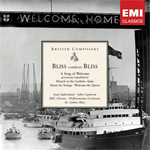 [‘Here
is a disc first and foremost for Bliss completists. It shows
Bliss as both the pastmaster of the occasional and the ceremonial
and as a fierily inspired craftsman.’ - see review
by Rob Barnett.]
[‘Here
is a disc first and foremost for Bliss completists. It shows
Bliss as both the pastmaster of the occasional and the ceremonial
and as a fierily inspired craftsman.’ - see review
by Rob Barnett.]
I don’t recall hearing any of this music before, apart
from the Miracle in the Gorbals suite, and, though I
take RB’s point that this is not Bliss for beginners, I
very much enjoyed hearing it all. The 1954 sound has come up
brilliantly well in this good mp3 transfer. At the time of writing,
the other EMI recording of Miracle in the Gorbals which
RB mentions was not available from classicsonline.com, but the
Groves recording of Morning Heroes has, happily, reappeared
on CD in company with Britten’s War Requiem (2CDs
for around £8: 5059092 or download from amazon.co.uk for
£5.49).
Carl ORFF (1895-1982) Carmina Burana
(1936)
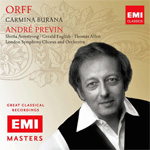 Sheila
Armstrong; Gerald English; Thomas Allen; St Clement Danes Boys’
Grammar School Choir; London Symphony Chorus and Orchestra/André
Previn - rec.1975. ADD.
Sheila
Armstrong; Gerald English; Thomas Allen; St Clement Danes Boys’
Grammar School Choir; London Symphony Chorus and Orchestra/André
Previn - rec.1975. ADD.
EMI CLASSICS MASTERS 5099963180251 [62:36] - from classicsonline.com
(mp3, £5.99)
For all the appeal of more recent digital recordings, this is
still one of the best Carmina Buranas on the market,
alongside the Jochum version on DG Originals - 447
4372 see August
2010 Roundup - both have much more life than Simon Rattle’s
disappointingly under-strength version and the EMI still sounds
well in the digital transfer of a recording that rather defeated
the recording engineers in its LP format. Make sure to choose
the right version - the older Great Recordings of the Century
version is also on offer at £7.99.
Aaron COPLAND (1900-1990)
Fanfare for the Common Man (1942) [3:39]
Appalachian Spring (1943) [36:42]
El Salon Mexico (1932) [10:50]
Old American Songs (1951) [24:55]
Orquesta Filarmonica de la Ciudad de Mexico/Enrique Batiz (Fanfare)
Saint Louis Symphony Orchestra/Leonard Slatkin (Appalachian)
Dallas Symphony Orchestra/Eduardo Mata (Mexico)
Bruce Hubbard (baritone)
Orchestra of St Luke’s/Dennis Russell Davies (Songs) - rec.
1985-1989. DDD
EMI AMERICAN CLASSICS 5099920663452 [76:31] - from classicsonline.com
(mp3) (£4.99)
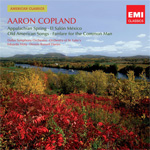 [‘A
generous, capable and engaging Copland collection.’ - see
review
by Rob Barnett. ‘A really successful disc … and a
good introduction to Copland’s work.’ - see review
by Simon Thompson]
[‘A
generous, capable and engaging Copland collection.’ - see
review
by Rob Barnett. ‘A really successful disc … and a
good introduction to Copland’s work.’ - see review
by Simon Thompson]
Idiomatic performances, well recorded in a good mp3 transfer.
The opening Fanfare may be a little understated and Copland’s
own Appalachian Spring may be preferable, but this EMI
version compensates by including the whole ballet - there’s
some fine music not included in the usual suite. Copland’s
own LSO recording seems not to be available on CD or as a download,
though amazon.co.uk has his recording of the Suite with the
Boston SO for £3.99 with the suite from The Tender
Land. Emusic.com offer the same recording in a Past Classics
transfer for less - just £1.26. Don’t forget the
Tilson Thomas recording of the complete Appalachian Spring
with Billy the Kid, still a bargain from amazon.co.uk
at £4.14, which I recommended in October
2009.
Walton conducts Walton
Sir William WALTON (1902-1958)
CD 1
Symphony No. 1 in b flat minor (1935)* [42:41]
Belshazzar’s Feast (1931)** [36:12]
CD 2
Violin Concerto (1939)*** [31:55]
Viola Concerto (1927)*** [25:55]
Partita for Orchestra (1957)* [15:50]
Donald Bell (bass)**; Philharmonia Choir**; Philharmonia Orchestra
or New Philharmonia Orchestra*/**
Yehudi Menuhin (violin and viola)***; London Symphony Orchestra***
all conducted by William Walton - rec. 1951 (mono, Symphony),
1953, 1959, 1970, 1959. ADD.
EMI CLASSICS 5099996894453 [2CDs: 2:31:34] - from classicsonline.com
(mp3, £5.99)
Scenes from Henry V and Richard III
Richard III: Prelude (arr. Muir MATHIESON) (1955)
[7:32]
Richard III: A Shakespeare Suite (arr. Muir MATHIESON)
(1955) [10:28]
Henry V Suite (arr. Muir MATHIESON) (1943) [15:14]
Spitfire Prelude [3:46] and Fugue [4:18] (1942)
Henry V: London, 1600 - Globe Theatre - Prologue: O for
a muse of fire - Speech before Harfleur: Once more unto the
breach - Act IV: Prologue: Now entertain conjecture of a time
- Night before the Battle: But if the cause be not good - Night
before the Battle: Upon the king! - This day is called the Feast
of Crispian - Once more I come to know of thee, King Harry -
I pray thee bear my former answer back - The Battle of Agincourt
- My duty to you both, on equal love - Epilogue: Thus far, with
rough and all-unable pen (Chorus) - Madrigal - Agincourt Song
(1943)* [34:17]
Laurence Olivier (speaker)*; Philharmonia Chorus; Philharmonia
Orchestra/William Walton - rec. 1943 (mono)*, 1963. ADD.
EMI CLASSICS 0724356500754 [75:06] - from classicsonline.com
(mp3, £4.99)
[see review
by Rob Barnett of 8-CD set which includes these two recordings.]
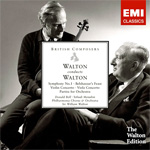 RB
thought the 8-CD excellent value at around £3 per CD which,
by coincidence, exactly matches the Walton conducts Walton
download at £5.99, whilst the single disc is a little
more expensive but still good value at £4.99 when both
contain so many riches in such little room. You should consider
supplementing Menuhin’s less than ideal accounts of the concertos
with the Nigel Kennedy recording (also EMI, not yet available
from classicsonline.com as I write*), but that’s my only reservation
concerning the 2-CD set. Even the mono sound of the First Symphony
- actually very good for its age - is no hindrance when the
performance is so authoritative - challenged but not superseded
by Previn on RCA, which in turn is challenged but not superseded
by the recent Hyperion.
RB
thought the 8-CD excellent value at around £3 per CD which,
by coincidence, exactly matches the Walton conducts Walton
download at £5.99, whilst the single disc is a little
more expensive but still good value at £4.99 when both
contain so many riches in such little room. You should consider
supplementing Menuhin’s less than ideal accounts of the concertos
with the Nigel Kennedy recording (also EMI, not yet available
from classicsonline.com as I write*), but that’s my only reservation
concerning the 2-CD set. Even the mono sound of the First Symphony
- actually very good for its age - is no hindrance when the
performance is so authoritative - challenged but not superseded
by Previn on RCA, which in turn is challenged but not superseded
by the recent Hyperion.
* amazon.co.uk have the Violin Concerto on a 2-CD set with the
Mackerras recordings of the two symphonies and the Tortelier
Cello Concerto - here
- for £5.99.
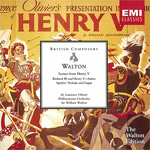 If
the Henry V music seems a bit of a muddle, with the short
Mathieson Suite, recorded in stereo, separated from the longer
excerpts from the 1943 film, recorded at around the same time
in mono, and with certain items common to both Suite and excerpts,
you may prefer the Chandos recording which I recommended some
time ago (CHAN10437 - see review).
That recording, with Christopher Plummer and Neville
Marriner is more logically constructed and also comes at
an attractive price (£3.99 in mp3, £7.99 lossless)
but, for me, for whom Olivier’s Richard III and
Henry V are often wrong-headed but completely sacrosanct,
it cannot replace the ‘real thing’ which we have here.
As RB wrote, ‘it all works very well’ and the new
transfer seems to have eliminated some of the whiskery 78 background
which he mentioned. In any case, however dry it may be - it’s
actually very good for its age - this is essential listening,
especially with the newer recordings of the Spitfire
and Richard III items thrown in.
If
the Henry V music seems a bit of a muddle, with the short
Mathieson Suite, recorded in stereo, separated from the longer
excerpts from the 1943 film, recorded at around the same time
in mono, and with certain items common to both Suite and excerpts,
you may prefer the Chandos recording which I recommended some
time ago (CHAN10437 - see review).
That recording, with Christopher Plummer and Neville
Marriner is more logically constructed and also comes at
an attractive price (£3.99 in mp3, £7.99 lossless)
but, for me, for whom Olivier’s Richard III and
Henry V are often wrong-headed but completely sacrosanct,
it cannot replace the ‘real thing’ which we have here.
As RB wrote, ‘it all works very well’ and the new
transfer seems to have eliminated some of the whiskery 78 background
which he mentioned. In any case, however dry it may be - it’s
actually very good for its age - this is essential listening,
especially with the newer recordings of the Spitfire
and Richard III items thrown in.
Dmitri SHOSTAKOVICH (1906-1975)
Symphony No.8 in c minor, Op.65 (1943)
London Symphony Orchestra/André Previn - rec.1973. ADD.
EMI CLASSICS ENCORE 5099950902453 [61:12] - from classicsonline.com
(mp3, £3.99)
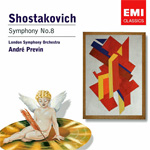 [‘I
can’t think of a better way to introduce a newcomer to
this work than by hearing this wonderful recording. In its latest
incarnation, it sounds terrific.’ - see review
by Leslie Wright]
[‘I
can’t think of a better way to introduce a newcomer to
this work than by hearing this wonderful recording. In its latest
incarnation, it sounds terrific.’ - see review
by Leslie Wright]
This recording is worth all the praise that LW and others have
heaped upon it. I last owned it in the early days of the music
cassette and I’m please to get to know it again, now sounding
much better than on cassette and at a very reasonable price.
As for the slight textual inaccuracy which LW mentions, I hardly
noticed it: Tauno Hannikainen introduced a much worse one into
his reading of Sibelius’s Second Symphony, from which I got
to know the work - one accepted as a genuine unpublished revision
for years because of Hannikainen’s friendship with the composer
- and it’s never harmed my appreciation of the music.
Elliott CARTER (b.1908)
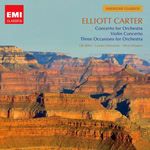 Three
Occasions for Orchestra (1987) [15:59]
Three
Occasions for Orchestra (1987) [15:59]
Violin Concerto (1990) [25:45]
Concerto for Orchestra (1989) [20:55]
Ole Böhn (violin); London Sinfonietta/Oliver Knussen -
rec. 1991. DDD
EMI AMERICAN CLASSICS 5099920662950 [63:13] - from classicsonline.com
(mp3) (£5.99)
[‘A superbly recorded and brilliantly performed Carter
collection.’ - see review
by Rob Barnett.]
Elliott Carter is a tougher nut to crack than Copland; of the
three works here, I find it possible to connect easily only
with the Violin Concerto. That’s well performed, so I gladly
take RB’s word for it that this is a very good anthology. Perhaps
those who, like me, have yet to come to terms with his music
would be better with the CD and its booklet of notes. The mp3
transfer is good.
Samuel BARBER (1910-1981)
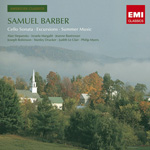 Cello
Sonata, Op.6 (1932) [18:56]
Cello
Sonata, Op.6 (1932) [18:56]
Alan Stepansky (cello); Israela Margalit (piano)
Canzone, Op.38a (1961) [4:25]
Jeanne Baxtresser (flute); Israela Margalit (piano)
Excursions, Op.20 (1942-44) [14:02]
Israela Margalit (piano)
Nocturne (Homage to John Field), Op.33 (1959) [4:27]
Summer Music, Op.31 (1956) [11:40]
Jeanne Baxtresser (flute); Joseph Robinson (oboe) Stanley Drucker
(clarinet); Judith LeClair (bassoon); Philip Myers (horn)
Souvenirs, Op.28 (version for piano solo) [6:52]
Israela Margalit (piano) - rec? DDD?
EMI AMERICAN CLASSICS 5099923447257 [60:27] - from classicsonline.com
(mp3, £4.99)
This is one of several recordings of Samuel Barber’s music
in the EMI American Classics series. The obvious starting point
would be the recording of Adagio, Knoxville - Summer
of 1915 and the Violin Concerto (Elmar Oliveira and Leonard
Slatkin - see review
- not yet available from classicsonline.com as I write), with
the current CD as a follow-up. I didn’t know most of this
music but particularly enjoyed Excursions, with folksy
adaptations of the likes of The Streets of Laredo. Idiomatic
performances, as far as I can judge, and well recorded; well
worth experimenting with.
William SCHUMAN (1910-1992)
Violin Concerto (1947-59) [32:38]
Leonard BERNSTEIN (1918-1990)
Serenade (after Plato’s Symposium) (1954) [30:25]
Robert McDuffie (violin); St Louis Symphony Orchestra/Leonard
Slatkin - rec.1989. DDD.
EMI AMERICAN CLASSICS 5099920661151 [64:03] - from classicsonline.com
(mp3, £5.99)
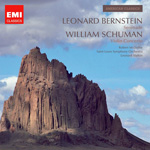 [‘McDuffie
and the St. Louis Symphony are poised and lyrical, capable and
musical, without quite setting me afire. In both works they
are capably conducted by Leonard Slatkin who contributes to
a pair of beautifully recorded well modulated performances.’
- see review
by Robert Hugill.
[‘McDuffie
and the St. Louis Symphony are poised and lyrical, capable and
musical, without quite setting me afire. In both works they
are capably conducted by Leonard Slatkin who contributes to
a pair of beautifully recorded well modulated performances.’
- see review
by Robert Hugill.
‘Here are two tensile lyrical violin concertos continuing
the romantic tradition yet without schmaltz.’ - see review
by Rob Barnett]
My colleagues have just about said it all, except that the transfers
are good and that those who know only the lighter side of Bernstein
should expect something more demanding.
Benjamin BRITTEN (1913-1976)
Spring Symphony, Op.44 (1949) [44:24]
Peter Grimes: Four Sea Interludes, Op.33a (1945) [16:20]
Dame Janet Baker (contralto), Sheila Armstrong (soprano), Robert
Tear (tenor); St. Clement Danes School Boys’ Choir; London Symphony
Chorus; London Symphony Orchestra/André Previn
EMI ENCORE 0077776473659 [60:44] - from classicsonline.com
(mp3) (£3.99)
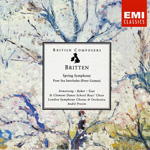 This
is just about the best Spring Symphony on the market,
not least because of the quality of the solo and choral singing
- Janet Baker’s contribution is especially welcome, while
Robert Tear evokes memories of Peter Pears without the coloration
that made Pears’ voice unacceptable to many. With a recording
which sounds well in mp3, this is superb value. If you don’t
know the Spring Symphony, a choral work with texts ranging
from Spenser to Auden, this is the way to get to know it. The
only reservation concerns EMI’s use of the same recording
of the Four Sea Interludes on other recordings - e.g. with Shostakovich’s
Fourth Symphony, also on the Encore label. If that’s a
problem or if you must have lossless sound, Chandos have their
Richard Hickox recording of the symphony, coupled with the Welcome
Ode and Psalm 150 to download from theclassicalshop.net
(CHAN8855).
This
is just about the best Spring Symphony on the market,
not least because of the quality of the solo and choral singing
- Janet Baker’s contribution is especially welcome, while
Robert Tear evokes memories of Peter Pears without the coloration
that made Pears’ voice unacceptable to many. With a recording
which sounds well in mp3, this is superb value. If you don’t
know the Spring Symphony, a choral work with texts ranging
from Spenser to Auden, this is the way to get to know it. The
only reservation concerns EMI’s use of the same recording
of the Four Sea Interludes on other recordings - e.g. with Shostakovich’s
Fourth Symphony, also on the Encore label. If that’s a
problem or if you must have lossless sound, Chandos have their
Richard Hickox recording of the symphony, coupled with the Welcome
Ode and Psalm 150 to download from theclassicalshop.net
(CHAN8855).
BIS recordings
from eclassical.com
I’ve included a few BIS recordings from eclassical.com in previous
Roundups, sometimes in tandem with Dan Morgan, and several of
them have featured as Download of the Month. That doesn’t mean
that we haven’t been uncritical at times, as in the case of
the Messiaen la Nativité in the previous Roundup, but
I wanted to feature some really recommendable items from their
back catalogue. As always, these are available in 16-bit lossless
sound for the same price as mp3 and that price is always very
competitive, being based on length in seconds. Many are also
available in 24-bit versions for a little more.
Johann Sebastian BACH (1685-1750)
I’ve included some recommendations from the BIS series of Bach
Cantatas in earlier Roundups:
- Volume 10 - Cantatas 105, 179 and 186: BIS-CD-951 (December
2010)
- Volume 33 - Cantatas 41, 92 and 130: BIS-SACD-1541 (December
2010)
- Volume 48 - Cantatas 34, 98, 117 and 120: BIS-SACD-1881 (Download
of the Month, July
2011/1)
The passionato.com links for Volumes 10 and 33 no longer apply:
go to eclassical.com for Volume 10 - here
- and Volume 33 - here.
Since I’m on record as saying that there should ideally be at
least one Bach Cantata recording in each Roundup, I’ll try to
make up for those months that didn’t qualify by recommending
volumes 38, 39, 42 and 46.
Cantatas - Vol. 38
Falsche Welt, dir trau ich nicht, BWV 52 (1726) [14:18]
Ich habe genug, BWV 82 (1727) [22:10]
Ich armer Mensch, ich Sündenknecht, BWV 55 (1726)
[14:23]
Ach Gott, wie manches Herzeleid, BWV 58 (1727) [13:54]
Carolyn Sampson (soprano); Robin Blaze (alto); Gerd Türk
(tenor); Peter Kooij (bass)
Bach Collegium Japan/Masaaki Suzuki - rec.2006. DDD.
Pdf booklet with texts and translations included.
BIS BIS-SACD-1631 [66:00] - from eclassical.com
(mp3, 16- and 24-bit lossless)
[‘The quality of the performances … easily matches
the rest of the series - and the recorded sound is superb.’
- see review
by Peter Bright.]
Cantatas - Vol. 39
Also hat Gott die Welt geliebt, BWV 68 (1725) [14:05]
Er rufet seinen Schafen mit Namen, BWV 175 (1725) [14:51]
Gottlob! Nun geht das Jahr zu Ende (1725) [13:16]
Sie werden euch in den Bann tun, BWV 183 (1725) [13:46]
Ich bin ein guter Hirt, BWV 85 (1725) [15:09]
Carolyn Sampson (soprano), Robin Blaze (counter-tenor), Gerd
Türk (tenor), Peter Kooij (bass)
Bach Collegium Japan/Masaaki Suzuki - rec. 2007. DDD.
Pdf booklet with texts and translations included.
BIS BIS-SACD-1641 [72:42] - from eclassical.com
(mp3, 16- and 24-bit lossless)
[‘Overall, when measured against the immensely impressive
standard set by Suzuki and BCJ, this is a slightly disappointing
volume. However, this is due as much to the relatively uneven
quality of the cantatas as the performances themselves. There
are delightful individual movements, and the entire opening
cantata is particularly memorable. I am deeply impressed with
Carolyn Sampson’s contributions, and I am convinced there
are very few (if any) sopranos able to challenge her in the
Baroque repertoire at present. Dmitry Badiarov also deserves
special mention for his exceptional playing throughout four
of the cantatas on this disc.’ - see review
by Peter Bright.]
Cantatas - Vol. 42
Alles nur nach Gottes Willen, BWV72 (1726) [15:07]
Liebster Jesu, mein Verlangen, BWV32 (1726) [22:46]
Meine Seufzer, meine Tränen, BWV13 (1726) [20:11]
Herr Gott, dich loben wir, BWV162 (1725) [15:51]
Rachel Nicholls (soprano); Robin Blaze (counter-tenor); Gerd
Türk (tenor); Peter Kooij (bass)
Bach Collegium Japan/Masaaki Suzuki - rec.2008. DDD.
Pdf booklet with texts and translations included.
BIS-SACD-1711 [75:24] - from eclassical.com
(mp3, 16- and 24-bit lossless)
[see review
by William Hedley: ‘Those collecting this series can …
add this one in without hesitation.’]
Cantatas - Vol. 46
Herr, Deine Augen sehen nach dem Glauben, BWV 102 (1726)
[20:45]
Es ist dir gesagt, Mensch, was gut ist, BWV 45 (1726)
[17:32]
Wer Dank opfert, der preiset mich, BWV 17 (1726) [15:09]
Es erhub sich ein Streit, BWV 19 (1726) [17:57]
Erschrecke doch (alternative version of tenor aria from
BWV 102) [4:37]
Hana Blažíková (soprano), Robin Blaze (counter-tenor),
Gerd Türk (tenor), Peter Kooij (bass)
Bach Collegium Japan / Masaaki Suzuki - rec.2009. DDD.
Pdf booklet with texts and translations included.
BIS BIS-SACD-1851 [76:24] - from eclassical.com
(mp3, 16- and 24-bit lossless)
[Recording of the Month - see review
by Peter Bright]
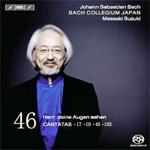 With
the possible slight exception of Volume 39 - and I think that
PB was being a little harsh even there - it’s apparent that
I could issue a blanket recommendation of the whole series.
As all these downloads are also offered in excellent 24-bit
sound and come complete with the booklets of notes, texts and
translations, I can’t think of any reason why any Bach lover
would not wish to download as many as he or she can afford.
By all means include some of John Eliot Gardiner’s very fine
recordings on his own SDG label, too, and don’t forget that
amazon.co.uk have the older Telefunken recordings from Harnoncourt
and Leonhardt at ridiculously inexpensive prices, still well
worth hearing, but BIS and Suzuki are probably the most consistently
recommendable and eclassical.com the place to download them.
With
the possible slight exception of Volume 39 - and I think that
PB was being a little harsh even there - it’s apparent that
I could issue a blanket recommendation of the whole series.
As all these downloads are also offered in excellent 24-bit
sound and come complete with the booklets of notes, texts and
translations, I can’t think of any reason why any Bach lover
would not wish to download as many as he or she can afford.
By all means include some of John Eliot Gardiner’s very fine
recordings on his own SDG label, too, and don’t forget that
amazon.co.uk have the older Telefunken recordings from Harnoncourt
and Leonhardt at ridiculously inexpensive prices, still well
worth hearing, but BIS and Suzuki are probably the most consistently
recommendable and eclassical.com the place to download them.
Georg Frideric HANDEL (1685-1759)
Concerti Grossi Op.6 (1739)
CD 1
No.1 in G, HWV319 [11:15]; No.2 in F, HWV320 [11:49]; No.3 in
e minor, HWV321 [11:36]; No.4 in a minor, HWV322 [11:28]; No.5
in D, HWV323 [14:50]
CD 2
No.6 in g minor, HWV324 [15:16]; No.7 in B flat, HWV325 [13:36];
No.8 in c minor, HWV326 [15:05]; No.9 in F, HWV327 [12:38];
No.10 in d minor, HWV329 [13:54]
CD 3
No.11 in A, HWV329 [16:29]; No.12 in b minor, HWV330 [11:39]
Arte dei Suonatori/Martin Gester - rec. 2007. DDD/DSD
Pdf booklet of notes included
BIS BIS-SACD-1705/06 [3 CDs: 62:32 + 72:03 + 29:04] -
from eclassical.com
(mp3, 16- and 24-bit lossless)
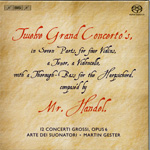 [‘I
just have to admit it, this is the best set of Handel’s
Concerti Grossi Op.6 I know; Hogwood and Harnoncourt
included… Don’t accept second best, sir; insist on
Gester!’ - see review
by Dominy Clements.]
[‘I
just have to admit it, this is the best set of Handel’s
Concerti Grossi Op.6 I know; Hogwood and Harnoncourt
included… Don’t accept second best, sir; insist on
Gester!’ - see review
by Dominy Clements.]
I’m not going to ditch Hogwood, Standage, Pinnock or the
Avison Ensemble set (Linn CKD362) which I recommended
as Download of the Month in July
2010, but I shall certainly be playing these recordings
alongside them - a little slower than most in places but still
full of life. I’m now really stuck as to what will be my
benchmark for this wonderful music - less immediately appealing
than the Op.3 set but much better constructed. The recording
is excellent, especially in 24-bit format.
Even though the SACDs retail as three-for-two (around £24
in the UK), eclassical.com’s price of $19.08 (mp3 or 16-bit
flac) or $28.61 (24-bit) is still very competitive - but so
is the Linn set at prices ranging from £13 (mp3) to £25
for 24-bit.
Georg Frideric HANDEL
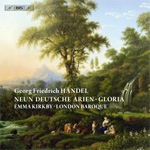 Neun
Deutsche Arien (Nine German Arias), HWV202-10 [42:27]
Neun
Deutsche Arien (Nine German Arias), HWV202-10 [42:27]
Trio Sonata in F, HWV 392 [10:42]
Gloria [15:41]
Emma Kirkby (soprano); London Baroque (Ingrid Seifert, Richard
Gwilt (violin); Charles Medlam (cello); Terence Charlston (harpsichord
and organ)) - rec.2006. DDD.
Pdf booklet included with texts and translations.
BIS-CD-1615 [69:47] - from eclassical.com
(mp3, 16- and 24-bit lossless)
Handel in Italy
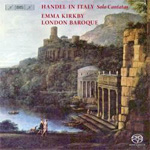 Notte
placida e cheta, HWV142 (1707) [15:07]
Notte
placida e cheta, HWV142 (1707) [15:07]
Un’ alma innamorata, HWV173 (1707) [13:30]
Concerto a Quattro in D [5:42]
Figlio d’alte speranze, HWV113 (1706) [9:59]
Agrippina condotta a morire or Dunque sarà
pur vero, HWV110 (1709) [22:05]
Emma Kirkby (soprano); London Baroque (Ingrid Seifert, Richard
Gwilt (violins); Charles Medlam (violoncello); Terence Charlston
(harpsichord)) - rec. 2007. DDD.
BIS BIS-SACD-1695 [67:23] - from eclassical.com
(mp3, 16- and 24-bit lossless)
Two aspects of Handel’s musical personality are encompassed
here: his German background and the Italianate style which he
developed as a young man in that country (1706-1710) and which
remained a prime element in his music for ever after. There
could hardly be better interpreters of his music than Emma Kirkby
and London Baroque, who reprise their earlier success for EMI
in the German Arias, while the Italian programme splendidly
supplements the Eloquence reissue of Emma Kirkby’s earlier
Oiseau Lyre programme of (different) Italian Cantatas (476
7468, well worth its budget price - see review
and review.)
If you must choose only one, go for the Italian Cantatas.
For details of the recent discovery of the Gloria on
the first disc, see Musicweb International article here.
Anders HILLBORG (b. 1954)
King Tide (1999) [13:33]
Exquisite Corpse (2002) [13:28]
Dreaming River (1998)* [20:14]
Eleven Gates (2005-2006) [18:59]
1. Drifting into D major [1:51]
2. Suddenly in the Room with Chattering Mirrors [2:09]
3. D major Still Life [00:24]
4. Confused Dialogues with Woodpecker [00:57]
5. Suddenly in the Room with Floating Mirrors [00:44]
6. Into the Great Wide Open [3:56]
7. Meadow of Sad Songs [2:47]
8. Toy Pianos on the Surface of the Sea [00:50]
9. String Quartet Spiralling to the Seafloor [00:45]
10. Seafloor Meditation (Whispering Mirrors at the Sea floor)
[1:45]
11. Waves, Pulse and Elastic Seabirds [2:51]
*Mårten Larsson & Ulf Bjurenhed (Chinese oboes)
Royal Stockholm Philharmonic Orchestra/Sakari Oramo (Tide),
Alan Gilbert (Corpse) & Esa-Pekka Salonen (Gates) - rec.2007/2010.
DDD/DSD Pdf booklet included
BIS-SACD-1406 [67:27] - from eclassical.com
(mp3, 16- and 24-bit lossless)
Over to Dan Morgan for this one:
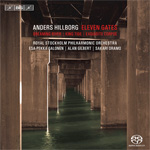 Anders
Hillborg’s rejection of what he calls ‘sado-modernism’ will
tempt enquiring listeners keen to try modern music without having
to endure an acid bath. This Swedish composer, rooted in pop
and electronic music but who now writes for orchestras, certainly
seems comfortable with the idea of ‘accessibility’, which some
contemporaries might regard as a sell-out. In the event, Hillborg
has received a number of commissions from high-profile bands
- the Berliner Philharmoniker among them - and has firm advocates
in the conductors Sakari Oramo, Alan Gilbert and Esa-Pekka Salonen.
And let’s not forget those canny people at BIS, who’ve long
championed out-of-the-way repertoire.
Anders
Hillborg’s rejection of what he calls ‘sado-modernism’ will
tempt enquiring listeners keen to try modern music without having
to endure an acid bath. This Swedish composer, rooted in pop
and electronic music but who now writes for orchestras, certainly
seems comfortable with the idea of ‘accessibility’, which some
contemporaries might regard as a sell-out. In the event, Hillborg
has received a number of commissions from high-profile bands
- the Berliner Philharmoniker among them - and has firm advocates
in the conductors Sakari Oramo, Alan Gilbert and Esa-Pekka Salonen.
And let’s not forget those canny people at BIS, who’ve long
championed out-of-the-way repertoire.
The first piece on this download - reviewed here in its 24-bit
form - is pretty straightforward; entitled King Tide,
it has a breathtaking shimmer and pulse that certainly impressed
me at the outset. Having lived with the piece for a week I’m
pleased to report it’s retained its mesmeric power, the
fine oscillations superbly caught by the BIS team. One could
be uncharitable and call it a superior sci-fi soundtrack, but
the piece has a complexity, a symphonic heft, that takes it
beyond such trifles. The virtuosity of the Stockholm band is
similarly assured, all of which makes for a most rewarding listen.
The glacial glissandi of Exquisite Corpse may
be punctuated by fragments and interjections, yet the music
maintains a distinct, unbroken dramatic curve from first to
last. That said, it’s the sonorities that really catch
one’s ear, the atavistic percussion similarly arresting.
Again one senses an organic unity in Hillborg’s writing,
the piece building to a riotous peak before subsiding into music
of almost Straussian opulence and lyricism. This really is demonstration
material, and I can only guess at how immersive this must be
in multichannel.
The reedy Chinese oboes in Dreaming River add more bright
threads to Hillborg’s musical tapestry. There’s a
virility of rhythm here that’s intoxicating, controlled
outbursts contrasting most effectively with quieter, more liquid
passages, And what a haunting, evanescent close. One might be
tempted to think of these as programmatic pieces - they have
titles, after all - but I find them more rewarding in the abstract,
as exercises in shifting dynamics, rhythms and textures. Even
then, Hillborg’s music remains refreshingly free of the
didactic, bullying style one associates with all too many contemporary
pieces.
The issue of programmes as narrative aids resurfaces in Eleven
Gates, each section of which purports to be a ‘gateway’
to odd, Carrollian worlds. In the booklet Sara Norling underlines
the work’s surrealist credentials - the titles certainly
suggest as much - but I don’t find that terribly helpful
in getting to grips with the music. Indeed, I often feel it’s
best to read these notes and promptly forget them as one listens.
It’s a lot more fun spotting the allusions in this score;
for instance, ‘Drifting into D major’ has an elemental
ebb and flow that reminds me of the start to Das Rheingold.
Very different from the spikily aphoristic ‘Suddenly in
the Room with Chattering Mirrors’; well, not quite, for
this section ends with a Wagnerian flourish too.
One passes through all these apertures at surprising speed,
from the static, half-minute ‘D major Still Life’
through to the Bartók-flavoured pianism of ‘Confused
Dialogues with Woodpecker’; in turn this slips seamlessly
into the swoop and glide of ‘Suddenly in the Room with
Chattering Mirrors’. And then there’s the stirring,
CinemaScope presentation of ‘Into the Great Wide Open’.
The latter has considerable sweep and power - there’s a
passing glimpse of Mahler’s Ninth, I’m sure - the
huge orchestral sound and lancing brass very well rendered.
After the fray the tranquil ‘Meadow of Sad Songs’
offers welcome respite; and is it my imagination or is there
a hint of Strauss again, this time of Eine Alpensinfonie?
It’s a measure of Hillborg’s compositional skill that he weaves
these elements into the music without it sounding nakedly derivative.
Moreover, he’s adroit at stitching together passages of broad
nobility and pure whimsy - the tiny tinkle of ‘Toy Pianos on
the Surface of the Sea’, for instance. And then there’s the
chamber-like scale and sonority of ‘String Quartet Spiralling
to the Seafloor’, which sits comfortably with the harp-led ‘Seafloor
Meditation’. And yet there’s contrast aplenty here, the hard-driving
‘Waves, Pulse and Elastic Seabirds’ bringing the work to a bracing
close.
This is a most stimulating collection, and sonically it’s one
of BIS’s best. It may not satisfy the ‘sado-modernists’ among
you, but then it’s not anodyne either.
Dan Morgan
http://twitter.com/mahlerei
***
Music for Henry V and the House of Lancaster
‘ROY HENRY’ (1386-1422)
Gloria [3:42]
The Office for St John of Bridlington: Antiphons and Responsory
[7:04]
Asperges me, Domine (chant, with faburden) [2:40]
Kyrie: Missa Quem malignus spiritus [6:58]
Gloria: Missa Quem malignus spiritus [6:27]
Ave regina cælorum (chant) [1:14]
Leonel POWER (d.1445) Ave
regina cælorum [2:53]
Credo: Missa Quem malignus spiritus [7:34]
Gloriosæ virginis (chant) [0:52]
Leonel POWER Gloriosæ
virginis [1:39]
Sanctus and Benedictus: Missa Quem malignus spiritus
[7:37]
[?Thomas] DAMETT (d.1436/7)
Salvatoris mater / O Georgi Deo [4:12]
John COOKE (c1385-?1442)
Alma proles / Christi miles [3:50]
[?Nicholas] STURGEON (d.1454)
Salve mater / Salve templum [3:03]
Agnus Dei: Missa Quem malignus spiritus [6:18]
Ite missa est … Agimus tibi gratias (Lucca Choirbook)
[2:00]
Tota pulchra es (chant) [2:01]
Walter FRYE (d.1475) Ave
regina cælorum a 4 [2:35]
The Binchois Consort (Mark Chambers, Timothy Travers-Brown (alto);
Richard Butler, Edwin Simpson, Matthew Vine, Christopher Watson
(tenor))/Andrew Kirkman
Pdf booklet with texts and translations included
HYPERION CDA67868 [72:47] - from hyperion-records.co.uk
(mp3 and lossless)
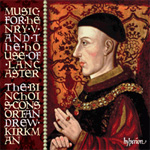 This
recording seeks to capture some of the brilliance of the court
of Henry V, victor of Agincourt, and of the music associated
with his royal chapel and that of his son, Henry VI, both of
whom had a special devotion to St John of Bridlington. The music
of some of the greatest figures of English music in the fifteenth
century, a time when it was as highly regarded internationally
as English needlework in rich ecclesiastical vestments, is included
here. Power and Frye, who were especially famous and justly
so, are joined by lesser musical luminaries, including the presumed
author of the opening Gloria, ‘Roy Henry’,
no less than Henry V himself. The antiphons and responsory from
the following Office of John of Bridlington are taken from one
of the few pre-reformation sources to have survived, the Wollaton
Antiphonal and chant is interspersed throughout the Mass Quem
malignus spiritus which forms the backbone of the music
and refers to the evil spirit which John of Bridlington cast
out.
This
recording seeks to capture some of the brilliance of the court
of Henry V, victor of Agincourt, and of the music associated
with his royal chapel and that of his son, Henry VI, both of
whom had a special devotion to St John of Bridlington. The music
of some of the greatest figures of English music in the fifteenth
century, a time when it was as highly regarded internationally
as English needlework in rich ecclesiastical vestments, is included
here. Power and Frye, who were especially famous and justly
so, are joined by lesser musical luminaries, including the presumed
author of the opening Gloria, ‘Roy Henry’,
no less than Henry V himself. The antiphons and responsory from
the following Office of John of Bridlington are taken from one
of the few pre-reformation sources to have survived, the Wollaton
Antiphonal and chant is interspersed throughout the Mass Quem
malignus spiritus which forms the backbone of the music
and refers to the evil spirit which John of Bridlington cast
out.
As Philip Weller’s excellent notes point out, the Mass
setting, the cantus firmus for which is taken for the
Office of John of Bridlington, and preserved in fragmentary
form in the Lucca Choirbook, was clearly composed for a group
of accomplished singers and the Binchois Consort provide just
that, to build on their earlier successes for Hyperion. They
appear to have absorbed modern research which suggests that
the vowel shift which divides modern English from earlier forms
took place earlier than previously believed and even affected
the pronunciation of Latin. (Credo and Deum pronounced
as if with the sound of the modern English ee.) With
good recording - lossless no more expensive than mp3 - and an
even more sumptuous booklet than Hyperion’s usual, lavishly
illustrated from the Wollaton Antiphonal, this has to be a strong
recommendation for lovers of late-medieval music.
Joseph HAYDN (1732-1809) String
Quartets Op 20 ‘Sun’
CD 1 [79:53]
No 1 in E flat [26:04]
No 2 in C [26:55]
No 3 in g minor [26:54]
CD 2 [80:25]
No 4 in D [30:18]
No 5 in f minor [30:06]
No 6 in A [19:59]
The London Haydn Quartet (Catherine Manson (violin); Michael
Gurevich (violin); James Boyd (viola); Richard Lester (cello))
- rec. September 2010. DDD.
Pdf booklet included.
HYPERION CDA67877 [2 CDs for price of one: 79:53 + 80:25]
- from hyperion-records.co.uk
(mp3 and lossless)
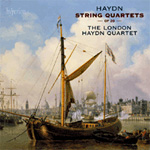 The
first thing to note is that this is a tremendous bargain - two
well-filled CDs for the price of one, containing performances
of the first set of quartets by the ‘father’ of the
genre which are regularly performed. The London Haydn Quartet,
who play with gut strings and classical bows, have already recorded
the earlier Op.9 and Op.17 sets, each also available as a 2-for-1
offer, and made good cases for at least some of the works included
there, but Op.20 brings us onto more mature territory, with
performances to match.
The
first thing to note is that this is a tremendous bargain - two
well-filled CDs for the price of one, containing performances
of the first set of quartets by the ‘father’ of the
genre which are regularly performed. The London Haydn Quartet,
who play with gut strings and classical bows, have already recorded
the earlier Op.9 and Op.17 sets, each also available as a 2-for-1
offer, and made good cases for at least some of the works included
there, but Op.20 brings us onto more mature territory, with
performances to match.
Michael Greenhalgh made the Op.17 set Recording of the Month
(see review).
There’s less competition there, but in Op.20 the London
players are up against stiff competition from the Quatuor Mosaïques
(Astrée Naïve E8802, also available as a 2-for-1
offer at around £12), who also perform in period fashion,
and the Lindsay Quartet on two hard to obtain ASV recordings.
Download the Mosaïques from classicsonline.com for £9.98
- here
- a very reasonable price for such fine performances, but still
more expensive than the Hyperion; that the Hyperion also comes
in lossless sound for the same price of £7.99 tips the
balance.
Felix MENDELSSOHN (1809-1847) Elijah (1846)
(sung in English)
Isobel Baillie (soprano), James Johnston (tenor), Gladys Ripley
(contralto), Harold Williams (bass-baritone); Ernest Cooper
(organ); Huddersfield Choral Society (chorus master Herbert
Bardgett); Liverpool Philharmonic Orchestra/Sir Malcolm Sargent
[from Columbia DX1408-23, 78 rpm, rec.1947. ADD/mono]
BEULAH EXTRA 22-23BX13 [2CDs: 64:22 + 59:48] - from eavb.co.uk
or as 56PD13 from iTunes (mp3, from 21 September 2011)
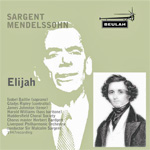 Recorded
to celebrate the centenary of Mendelssohn’s death in 1947
in a slightly cut performance by forces better known for all-but-the-kitchen-sink
Handel’s Messiah, the reissue just misses the bicentenary
of his birth but is none the less very welcome. I don’t
mean to sound dismissive: this is the kind of performance that
first introduced me both to Messiah and to Elijah,
though on the other side of the Pennines from Huddersfield and,
indeed, it’s much more appropriate for Mendelssohn than
for Handel. Oddly enough, when reviewed in 1947 it was thought
a bit new-fangled: WRA wrote ‘the soloists are sound if
not always like those I was brought up to judge by’. In
fact the soloists are more than merely ‘sound’ and
I’m surprised to find them so described; Isobel Baillie
in particular was a noted soprano soloist in Messiah and Elijah
and at 52 still in good voice. By today’s standards, the
female soloists sound a trifle plummy and their male counterparts
a bit stentorian: think the sung equivalent of Pathé
newsreel speak if you can remember that far back.
Recorded
to celebrate the centenary of Mendelssohn’s death in 1947
in a slightly cut performance by forces better known for all-but-the-kitchen-sink
Handel’s Messiah, the reissue just misses the bicentenary
of his birth but is none the less very welcome. I don’t
mean to sound dismissive: this is the kind of performance that
first introduced me both to Messiah and to Elijah,
though on the other side of the Pennines from Huddersfield and,
indeed, it’s much more appropriate for Mendelssohn than
for Handel. Oddly enough, when reviewed in 1947 it was thought
a bit new-fangled: WRA wrote ‘the soloists are sound if
not always like those I was brought up to judge by’. In
fact the soloists are more than merely ‘sound’ and
I’m surprised to find them so described; Isobel Baillie
in particular was a noted soprano soloist in Messiah and Elijah
and at 52 still in good voice. By today’s standards, the
female soloists sound a trifle plummy and their male counterparts
a bit stentorian: think the sung equivalent of Pathé
newsreel speak if you can remember that far back.
Autres temps … indeed. My own benchmark, itself
somewhat dated now, is provided by Wolfgang Sawallisch on Philips
Duo, sung in German. (Formerly on 438 3682 and worth reissuing
by Eloquence, though the fact that they have chosen the older
Josef Krips recording probably rules that out.) The language
is largely irrelevant, since, like Haydn’s Creation,
Elijah/Elias has led a bilingual existence almost from
the start and many will prefer English, especially as the Sawallisch
came without texts.* On the other hand, the large size of the
chorus and 1947 recording mean that only the soloists’
words are really clear. More to the point, the Dresden Staatskapelle
provide fresher accompaniment than the RLPO who, even in 1947,
were described as plodding in Mendelssohn’s more ‘square-toed’
music. On the other hand there’s no doubting Sargent’s
absolute commitment to the music. He was something of a man
for all seasons, turning his hand to performances of all kinds
of music that were always very competent though rarely more,
but his Messiah and Elijah transcend his usual
standard. Try the closing chorus of Part 1 if you want to be
uplifted.
The recording was thought to leave something to be desired in
1947, especially in terms of balance, so I would have expected
some pretty dire sound had Barry Coward of Beulah not alerted
me to the quality of what he had conjured out of the ancient
grooves. Hi-fi it certainly isn’t, but it is remarkably
good for its age, with just a trace of surface noise (at the
ends of sides, I think). I can well believe that those who know
the Huddersfield sound think it perfectly recreated here. Thus
an important historical document becomes more of a pleasure
too.
There’s a Classics for Pleasure bargain release of a later
(1950s) Sargent recording, again with the Huddersfield and Liverpool
forces but with different soloists who were preferred at the
time (5759752), available for around £7.50 in the UK.
If you’re going for the real thing, however, it’s
the 1947 version that you want and Beulah give it to you for
a small fraction of what those 16 78 rpm discs cost and without
all that side-turning. (Though an automated version was available,
the kind boggles at the thought of balancing 16 shellac discs
on an auto-changer.)
* both English and German texts are readily available online.
Nikolay Andreyevich RIMSKY-KORSAKOV (1844-1908)
Capriccio espagnol, Op. 34 [16:20]
Overture to May Night [8:26]
Overture to The Tsar’s Bride [6:12]
Overture on Russian Themes, Op. 28 [11:34]
Overture to The Maid of Pskov [5:25]
Dubinushka, Op. 62 [3:49]
Russian Easter Overture, Op. 36 [15:16]
Seattle Symphony/Gerard Schwarz - rec.2010/2011. DDD.
Pdf booklet included.
NAXOS 8.572788 [67:05] - from classicsonline.com
(mp3) or stream from Naxos Music Library
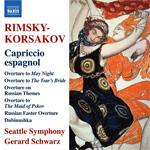 This
follows hard on the heels of Schwarz’s Sheherazade,
also on Naxos, which has won golden opinions all round: see
review
(Bargain of the Month), review and March
2011/1 Roundup. This is rousing music but it’s also
music to wallow in and Schwarz gives you both aspects - a brisk
account of Capriccio espagnol gets us off to a good start,
followed by a May Night that begins with all the mystery
of Ansermet’s classic account but in better sound. The
Overture on Russian Themes almost brings the house down,
but leave just enough voltage for the Easter Overture,
my favourite of all Rimsky favourites, to finish in rousing
style.
This
follows hard on the heels of Schwarz’s Sheherazade,
also on Naxos, which has won golden opinions all round: see
review
(Bargain of the Month), review and March
2011/1 Roundup. This is rousing music but it’s also
music to wallow in and Schwarz gives you both aspects - a brisk
account of Capriccio espagnol gets us off to a good start,
followed by a May Night that begins with all the mystery
of Ansermet’s classic account but in better sound. The
Overture on Russian Themes almost brings the house down,
but leave just enough voltage for the Easter Overture,
my favourite of all Rimsky favourites, to finish in rousing
style.
With good mp3 sound, this is a strong recommendation, unless
you already have the Neeme Järvi budget-price 2-CD set
on Chandos of May Night and the operatic suites (CHAN10369)
and/or the Fantasy on Russian Themes (CHAN10491,
with music by Taneyev), both of which I recommended in December
2008. Good alternatives for the Easter Overture come
on Hyperion Helios CDH55137 (Svetlanov, with Antar)
and Chandos Collect 2-for-1 CHAN6613 (Kitajenko, with
Symphonies 1-3 and the Piano Concerto), both recommended in
March
2010.
Gabriel FAURÉ (1845-1924)
Requiem, Op.48 (1893 version, with lower strings) [34:45]
Ave verum corpus, Op.65/1 [3:37]
Tantum ergo sacramentum, Op.65/2 [2:28]
Ave Maria, Op.67/2 [1:55]
Maria, Mater gratiæ, Op.47/2 [2:40]
Cantique de Jean Racine, Op.11 (ed. Rutter) [6:40]
Messe Basse [10:15]
Caroline Ashton (soprano); Stephen Varcoe (baritone); John Scott
(organ); Simon Standage (violin); Cambridge Singers; City of
London Sinfonia/John Rutter - rec. c.1983. DDD
COLLEGIUM COLCD109 [61:29] - from classicsonline.com
(mp3)
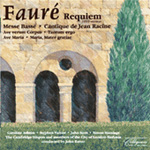 I’m
less impressed by the fact that Rutter employs the 1893 version,
with lower strings but no violins, than by the sheer spirituality
of this performance of the most gentle of Requiems, Duruflé’s
- closely modelled on the Fauré - only excepted. This
recording first released in 1984 on the defunct Conifer label
and (twice) reissued by Rutter’s own Collegium, has justifiably
become something of a classic.
I’m
less impressed by the fact that Rutter employs the 1893 version,
with lower strings but no violins, than by the sheer spirituality
of this performance of the most gentle of Requiems, Duruflé’s
- closely modelled on the Fauré - only excepted. This
recording first released in 1984 on the defunct Conifer label
and (twice) reissued by Rutter’s own Collegium, has justifiably
become something of a classic.
I obtained this as a lossless download from passionato.com,
in which format it sounds very well but, in view of the problems
with this site that I’ve mentioned, I’ve given an
additional link to the classicsonline.com version in reliable
320kb/s mp3. They have another download, derived from the most
recent release (2010) on CSCD520 - here
- which you may prefer because it comes with the booklet.
There’s also an excellent version from the Corydon Singers
on Hyperion
CDA30008,
with couplings almost identical to those on Collegium, or more
generously coupled with the Duruflé Requiem:
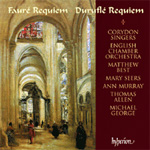 Gabriel
FAURÉ Requiem Op.48 (1893 version)*
[36:18].
Gabriel
FAURÉ Requiem Op.48 (1893 version)*
[36:18].
Maurice DURUFLÉ (1902-1986)
Requiem (third version)** [41:26]
Mary Seers (soprano)*; Michael George (baritone)*; Ann Murray
(soprano)**; Thomas Allen (baritone)**; Corydon Singers; John
Scott*, Thomas Trotter** (organ); English Chamber Orchestra/Matthew
Best - rec.1985. DDD.
Pdf booklet with texts and translations included.
HYPERION CDA67070 [77:07] - from hyperion-records.co.uk
(mp3 and lossless)
For this version of the Fauré, please refer to the October
2010 Roundup. The Rutter version may have just a slight
edge in Fauré but for those who would also like the Duruflé
the Best version represents formidable value.
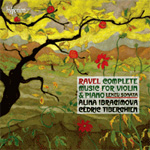 Guillaume
LEKEU (1870-1894)
Guillaume
LEKEU (1870-1894)
Violin Sonata in G (1892-3) [33:40]
Maurice RAVEL (1875-1937)
Violin Sonata No 1 in A, posthume (1897) [14:04]
Violin Sonata No 2 in G (1923-7) [18:10]
Tzigane: rapsodie de concert (1924) [9:56]
Berceuse sur le nom de Gabriel Fauré (1922) [3:07]
Alina Ibragimova (violin); Cédric Tiberghien (piano)
- rec. November 2010. DDD.
Pdf booklet included
HYPERION CDA76820 [78:55] - from hyperion-records.co.uk
(mp3 and lossless)
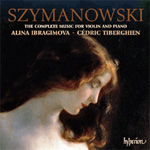 Karol
SZYMANOWSKI (1882-1937) The Complete Music for Violin
and Piano
Karol
SZYMANOWSKI (1882-1937) The Complete Music for Violin
and Piano
Nocturne and Tarantella, Op. 28 (1915) [11:40]
Mythes (La fontaine d’Aréthuse; Narcisse;
Dryades et Pan) Op. 30 (1915) [21:02]
Romance in D, Op. 23 (1910) [6:10]
Violin Sonata in d minor, Op. 9 (1904) [20:03]
Three Paganini Caprices, Op. 40 (1918) [14:24]
Lullaby ‘La Berceuse d’Aïtacho Enia’,
Op. 52 [3:56]
Alina Ibragimova (violin); Cédric Tiberghien (piano)
- rec. July 2008. DDD
Pdf booklet included
HYPERION CDA67703 [76:15] - from hyperion-records.co.uk
(mp3 and lossless)
There’s something old and something new here. I’m
grateful to Hyperion not only for their new recording of Ravel’s
music for violin and piano - well deserving of their own designation
as Recording of the Month - but also for the ability to dig
out the earlier Szymanowski recording from their back catalogue.
The two together as downloads will cost about as much as one
full-price CD and if you choose one of the lossless formats
there should be no difference in quality.
Rob Barnett thought the earlier recording a natural and inspired
choice for an accessible collection of this repertoire - see
review
- and I see no reason not to describe the Ravel and Lekeu in
the same manner. The Lekeu is somewhat undemonstrative by comparison
with Ravel, fragrant rather than forceful, so it was an excellent
idea to place it first and for the performers to resist over-egging
the pudding here and in the earlier Ravel Sonata.
We’re not short of good performances of the Ravel G major
Violin Sonata, variously coupled, sometimes with Tzigane.
My benchmark remains the Grumiaux/Hajdu, now on Eloquence
468 3062, at budget price, with the Ravel Piano Trio and
Debussy’s cello and violin sonatas, of which Jonathan Woolf
wrote that none is better - see review
- but no other version exactly matches the coupling here and
there’s always room for performances and recordings of
the calibre of the Hyperion. The performers capture not only
the bluesy aspects of the G major Sonata but all the other moods
of the music.
Howard HANSON (1896-1981)
Symphony No. 1 ‘Nordic’ (1922) [29:23]
The Lament for Beowulf (1925)* [19:11]
Seattle Symphony and *Chorale/Gerard Schwarz - rec.1988, 1990.
DDD.
Pdf booklet with sung texts included
Previously available from Delos International.
NAXOS AMERICAN CLASSICS 8.559700 [48:34] - from classicsonline.com
(mp3) or stream from Naxos Music Library
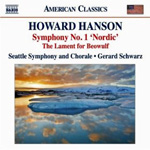 Naxos
already had a recording of the Nordic Symphony in their catalogue,
conducted by Kenneth Schermerhorn (8.559072, with Merry
Mount) - see review
by John Phillips, which includes a comparison with the Schwarz
version, then on Delos. I haven’t heard that other version
but I doubt that it excels Schwarz, except in terms of more
generous playing time. JP thought the comparison swings and
roundabouts. Now that Hanson’s own Mercury recordings seem
to be no longer readily available (see below and review
by Rob Barnett), though they won’t be getting thrown out
from my collection, this is the version to have. The mp3 transfer
does justice to the recording.
Naxos
already had a recording of the Nordic Symphony in their catalogue,
conducted by Kenneth Schermerhorn (8.559072, with Merry
Mount) - see review
by John Phillips, which includes a comparison with the Schwarz
version, then on Delos. I haven’t heard that other version
but I doubt that it excels Schwarz, except in terms of more
generous playing time. JP thought the comparison swings and
roundabouts. Now that Hanson’s own Mercury recordings seem
to be no longer readily available (see below and review
by Rob Barnett), though they won’t be getting thrown out
from my collection, this is the version to have. The mp3 transfer
does justice to the recording.
Passionato.com list Hanson’s own Mercury recording of the
Third Symphony and Lament for Beowulf but, in common
with all my recent experiences from this source, my ‘payment’
- actually a reviewer’s code - was accepted but the download
failed. [NB: passionato.com have promised to follow up
any reports of failed downloads.] Amazon.co.uk have the 4-CD
Mercury set Hanson conducts Hanson to download for £15.99
- here.
Kenneth LEIGHTON (1929-1988)
Te Deum laudamus (1964) [9:58]
Missa Brevis Op 50 (1967) [13:08]
Lully, lulla, thou little tiny child Op 25b [3:12]
Crucifixus pro nobis Op 38 (1961) [21:57]
The Second Service Op 62 (1971) [12:06]
An Evening Hymn (1979) [8:54]
Let all the world in every corner sing (1965) [3:35]
Neil Mackie (tenor); The Choir of St Paul’s Cathedral;
Andrew Lucas (organ)/John Scott - rec.1992. DDD.
Pdf booklet with texts included.
HYPERION HELIOS CDH55195 [73:30] - from hyperion-records.co.uk
(mp3 and lossless)
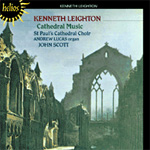 This
recording needs you! It’s drifted through no fault of its
own into the ‘please buy me’ category, where it’s
been available for £2.80 on CD. It won’t still be
there when you read this, but it really is worth buying as a
download for £5.99, preferably in lossless format. [NB:
Until the end of September, all Helios CDs and downloads are
discounted by 20%. That includes their October and November
releases on the Helios label, which are already available for
download.]
This
recording needs you! It’s drifted through no fault of its
own into the ‘please buy me’ category, where it’s
been available for £2.80 on CD. It won’t still be
there when you read this, but it really is worth buying as a
download for £5.99, preferably in lossless format. [NB:
Until the end of September, all Helios CDs and downloads are
discounted by 20%. That includes their October and November
releases on the Helios label, which are already available for
download.]
No sooner had it been removed from the list than it was replaced
by another recording of Kenneth Leighton’s music, The
World’s Desire (CDA67641).
I publicised its first appearance among the waifs and strays
in the March
2011/2 Roundup, directed readers to John Quinn’s review
(Recording of the Month) and urged its purchase
in one form or another, yet here it is again. What is it that
we aren’t doing sufficiently well to persuade enough listeners
to try Leighton’s blissful music? Perhaps I might have
more success if I directed you towards a new 61-minute recording
of his chamber music for cello and piano, available from classicsonline.com
- here
- or to stream from Naxos Music Library, on British Music Society
BMS439CD (mp3).
Indian Classical Music
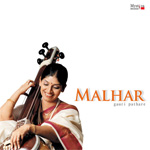 Raga
Gaud Malhar [27:20]
Raga
Gaud Malhar [27:20]
Raga Sur Malhar [28:44]
Raga Basant [14:57]
Gauri Pathare (voice and sitar) - rec.2007. DDD(?)
MYSTICA MUSIC [71:01] - from emusic.com
(mp3)
I’m no expert on Indian classical music but this sounds
pretty authentic to me. At just £1.26 or less, as opposed
to £6.99 from amazon.co.uk, you can afford to experiment.
Malhar is the name of a traditional Indian raga associated
with the coming of rain and Raga Basant is associated
with the Sikh tradition. The name is derived from Sanskrit vasant,
Spring. There’s more information on the Mystica Music webpage
- here
- but it would be nice to have access to texts and translations.
Classical Britain
Gustav HOLST (1874-1934)
St Paul’s Suite [3:03 + 1:51 + 4:20 + 3:15]
Boyd Neel String Orchestra/Boyd Neel
Somerset Rhapsody [9:24]
Bournemouth Symphony Orchestra/Charles Groves
Frederick DELIUS (1862-1934)
North Country Sketches (1913/14) [7:13 + 4:04 + 5:48 + 7:33]
Royal Philharmonic Orchestra/Sir Thomas Beecham
Grace WILLIAMS (1906-1977)
Fantasia on Welsh Nursery Tunes (1940) [10:07]
London Symphony Orchestra/Mansel Thomas
Percy GRAINGER (1882-1961)
Handel in the Strand* [3:46]
Country Gardens* [1:34]
Shepherd’s Hey* [1:39]
Mock Morris [2:58]
Molly on the Shore [3:28]
Early one Morning [3:31]
Irish Tune from County Derry [3:33]
Percy Grainger (piano); Leopold Stokowski and his Orchestra
Rec. 1948-1957. ADD/mono
BEULAH 1PD58 [77:07] - from iTunes (mp3, from 14 September
2011)
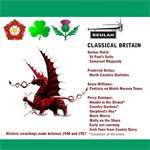 This
geographical-musical tour is really a useful peg on which to
hang refurbishments of some recordings from the late 1940s and
1950s. Of course, not every title has a geographical tag, some
obvious titles such as Brigg Fair are omitted and, strictly
speaking, County Derry is not in Great Britain, though it is
part of the UK. EMI have had a similar idea for a 2-CD anthology
The British Composers Guide to Britain which casts its
net rather wider and contains only one overlap with this Beulah
release in the Dargason movement from the St Paul’s Suite.
This
geographical-musical tour is really a useful peg on which to
hang refurbishments of some recordings from the late 1940s and
1950s. Of course, not every title has a geographical tag, some
obvious titles such as Brigg Fair are omitted and, strictly
speaking, County Derry is not in Great Britain, though it is
part of the UK. EMI have had a similar idea for a 2-CD anthology
The British Composers Guide to Britain which casts its
net rather wider and contains only one overlap with this Beulah
release in the Dargason movement from the St Paul’s Suite.
Boyd Neel and his orchestra provided some staple recordings
for Decca in the 1940s and 1950s and the four movements of Holst’s
St Paul’s Suite are among their best offerings, presented
here in thin but very acceptable sound.
The Somerset Rhapsody has been rescued from Classics
Club, later reissued on a crackly Saga LP for 10/- (£0.50).
It’s the sort of music that was meat and drink to Sir Charles
long before he became the Grand Old Man of British music and
it sounds well. Beecham’s Delius has even more classic
status, as evidenced by this mono recording of North Country
Sketches, which I first encountered on a Philips GL-label
LP - originally recorded on 78s (Columbia LX1399-41), and sounding
every bit of it on LP as I recall, despite Trevor Harvey’s
comments to the contrary when the Philips LP was released in
1964. I wouldn’t have recognised the glowing Beulah transfer
as the same recording - either the Columbia original was better
than the Philips reissue or Barry Coward has worked magic on
it, as he so often does.
The new reissue makes a welcome supplement to the mono and stereo
recordings of Beecham’s Delius included in the recent 6-CD
anthology of British music from EMI (see Rob Barnett’s
review)
which was my Bargain of the Month in July
2011/1. An earlier (1945) recording of the Sketches
with the LPO features in an all-Delius programme on Somm SOMM-BEECHAM10*,
but includes Autumn and Winter only, so the Beulah version is
all the more welcome. There are too few recordings of this work
to ignore either of these Beecham versions and, in any case,
his way with Delius is unbeatable. Vernon Handley on Chandos
is the sole current alternative for the complete thing, best
obtained on the 2-for-1 The Essential Delius, CHAN241-37,
reviewed in January
2009. Mark Elder and the Hallé have recorded The
March of Spring on their excellent recent anthology English
Spring (CDHLL7528 - Recording of the Month:
see review,
review
and August
2011/1 Roundup: Download of the Month).
Though reissued with the Holst on a 10" Decca LP in 1951,
the Fantasy on Welsh Nursery Tunes had been released
on 78s in 1949. It’s an attractive and very competent work,
though slightly banal after the Delius, alternatively to be
found in the context of other music by this little-known composer
on Lyrita SRCD.323 - see review
and review
- available on CD from Musicweb International here;
neither emusic nor amazon, the usual sources for Lyrita downloads,
appears to offer it. Again the recording belies its 78 rpm origin
in the Beulah transfer.
There had to be some Percy Grainger half a century after his
death and these Stokowski recordings are just the thing to round
off this recording in style. Grainger himself joins in the first
three items without the faux pas that spoil some of his
other recordings. Excellent transfers again, apart from a slightly
sharp cut-off of the ambiance after some tracks; if it wasn’t
there, I suppose that’s better than creating it artificially
and it’s not much of a problem.
* download in mp3 or lossless from theclassicalshop.net - here
- but please note that at £9.99 the lossless version is
actually more expensive than the CD as offered by some online
dealers.















